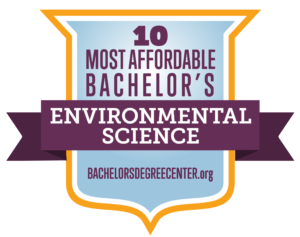
Key Information:
- CUNY Brooklyn College and University of Texas — Rio Grande Valley are two top schools for an affordable environmental science bachelor’s degree.
- Many state schools allow students to transfer credits from community colleges, which helps reduce overall tuition costs while obtaining an associate’s degree along the way.
- Save money by planning ahead, attending a community college first, and choose a school with a good reputation and accreditation.
You can save money on an environmental science degree in a number of ways. Planning before you attend, going to community college to take transferrable electives, shop around for a school, and don’t take classes you don’t need. Another option is to look for the cheapest online environmental science degree that’s offered by a school with a solid reputation and accreditation for their environmental science program.
The most affordable environmental science degrees are usually found at state schools, but with a bit of planning and strategy, you can attend a reputable school and save money on your tuition.
Community college is an excellent option for saving money on your environmental science degree. If you want to attend a state school for your environmental science bachelor’s degree, you can usually transfer your community college credits to a state school and continue your next two years of education at the state university or college. The cost of education at community college is always cheaper than it is at a four-year school, and you can earn an associate’s degree in environmental science along the way. Getting an associate’s degree in environmental science can also help you get employment if you decide to work prior to attending school for a bachelor’s degree in environmental science.
Methodology: Ranking the Most Affordable Environmental Science Degrees
In the Bachelor’s Degree Center ranking of the most affordable environmental science degree programs, cost is crucial, so programs are presented in order of tuition cost according to current IPEDS data. But quality is also important, so we feature only accredited schools known for quality and return on investment.
| School | Tuition (Est.) | Accreditation | Degree Options | Unique Features |
|---|---|---|---|---|
| CUNY Brooklyn College | ~$7,500 in-state | Middle States Commission on Higher Education | BS in Earth & Environmental Sciences | Strong NYC location; interdisciplinary curriculum; >83% receive financial aid |
| University of Texas – Rio Grande Valley | ~$8,200 in-state | Southern Association of Colleges & Schools (SACSCOC) | BS in Environmental Science | High acceptance (80%+); strong focus on federal/state/local careers; 91% financial aid rate |
| CUNY Lehman College | ~$7,500 in-state | Middle States | BS in Environmental Science (multiple specializations) | Urban environmental focus; strong NYC access; ranked among top NY publics |
| California State University, Northridge | ~$7,000 in-state | WASC Senior College & University Commission | BA/BS in Geography & Environmental Studies | GIS specialization; options for teaching pathways; LA metro resources |
| University of Washington – Bothell | ~$12,000 in-state | NWCCU (Northwest Commission on Colleges and Universities) | BS in Environmental Science (earth systems / ecology) | Smaller campus; part of UW system; strong Seattle-area opportunities |
| Brigham Young University – Idaho | ~$4,500 private | NWCCU | BS in Environmental Geoscience | Requires internship; strong faith-based learning; career & graduate prep |
| California State University, Fullerton | ~$7,000 in-state | WASC | BA in Environmental Studies | Large Hispanic-Serving Institution (HSI); strong pathways to grad study |
| CUNY City College of New York | ~$7,500 in-state | Middle States | BS in Environmental Earth System Science (3 specializations) | Strong engineering/environment crossover; >87% students receive aid |
| California State University, San Bernardino | ~$7,000 in-state | WASC | BA in Environmental Studies | Interdisciplinary tracks in sustainability/systems; high acceptance rate (89%) |
| CUNY Queens College | ~$7,500 in-state | Middle States | BS/BA in Environmental Science or BA in Environmental Studies | Flexible tracks (science vs general); strong public reputation; 79% aid |
1. CUNY Brooklyn College

CUNY Brooklyn College Earth and Environmental Sciences BS that’s one of the most affordable environmental science degrees. Graduates learn how to describe processes taking place on the earth’s landscape and beneath the surface. Students also learn about how these processes are affected by humans. Subjects covered include physics, 3D features and structures and tools used to conceptualize the earth and its environment as a connected system. Learners also emerge ready to communicate these concepts to various audiences.
CUNY Brooklyn College is located in the New York City, and this large school has more than 11,000 undergraduate students. The competitive acceptance process results in 45% of applicants being accepted into the school. Meanwhile, 55% must pursue other academic opportunities. Popular majors include accounting, business and psychology.
What We Like: More than 83% of students receive some kind of financial aid.
Degree: Earth and Environmental Sciences BS
2. University of Texas — Rio Grande Valley

At the University of Texas — Rio Grande Valley, students can attend one of the most affordable environmental science degrees in the country. UTRGV’s environmental science BS prepares students for careers at the federal, state, and local levels. Other graduates go on to work for environmental consulting firms and nonprofit organizations. some students decide to pursue a graduate degree in scholarship or research opportunities. The program focuses on environmental issues and students get to choose an area of focus.
About 82% of students at the University of Texas — Rio Grande Valley feel that their teachers put a lot of effort into their teaching. Additionally, 64% of students said they got the classes they wanted when they needed them.
What We Like: the university accepts four out of five students who apply and 91% of students who attend have some form of financial aid.
Degree: Environmental Science BS
3. CUNY Lehman College

CUNY Lehman College’s BS in Environmental Science is one of the most affordable environmental science degrees students can choose. This interdisciplinary program consists of 46 credits needed to complete the major. Both basic and advanced scientific courses make up the majority of these classes and students choose from a number of specializations. Specializations include urban environmental management, ecology, environmental analysis and geology. Required courses include introduction to environmental science, environmental science laboratory, and quantitative geography.
This prestigious school offers an eclectic study body and easy access to New York City. It has a highly competitive acceptance process.
What We Like: CUNY Lehman College ranks eighth among New York stop public universities.
Degree: Environmental Science BS
4. California State University, Northridge

California State University, Northridge also has one of the most affordable environmental science degrees. Graduates emerge with a BA or BS in Geography and Environmental Studies. This program prepares students to examine the environment across the earth’s surface. consisting of 46 credits, coursework for this tract includes social science, physical and regional geography and related coursework. Students can choose from a number of specializations including geographic informational systems or GIS. GIS classes teach students the technology needed to pursue careers in digital cartography, remote sensing and other geographical data collection and presentation. There’s also an option for those who wish to teach after graduation.
Cal State Northridge is located in Los Angeles. This huge institution has more than 29,000 undergraduate students. The fairly competitive admissions process admits three out of five students. Those who make the cut can major in business, psychology, sociology or dozens of other majors.
What We Like: The school’s competitive acceptance process means that just 59% of students who apply get the green light to attend. However, once they are accepted, students have a good chance of getting financial aid as 86% of current students do.
Degree: BA or BS in Geography and Environmental Studies
California State University, Northridge
5. University of Washington — Bothell

The University of Washington-Bothell’s Environmental Science BS is one of the most affordable environmental science degrees. Students majoring in environmental sciences can complete pathways in earth system science or conservation-restoration ecology. However, the university is currently not accepting new students into this program.
UW Bothell is located in the Seattle area in Washington. This small school has just over 4,600 undergraduate students and a moderately competitive acceptance rate of 74%. Among many of its majors, the most popular are nursing, business and computer science.
What We Like: The University of Washington-Bothell ranks third among the state’s top public universities.
Degree: Environmental Science BS
University of Washington-Bothell
6. Brigham Young University — Idaho

Brigham Young University-Idaho offers a BS in Environmental Geoscience that is one of the most affordable environmental science degrees. This BS allow students to prepare for careers in environment management. Other students go on to study environmental hazards or policies. The interdisciplinary degree includes technical as well as theoretical subject matter. For example, students take required courses in GIS and statistics. Graduates can look forward to jobs in government or regulatory agencies. Many students also go on to get their master’s degree after completing this track. To better prepare students for a career or future studies, the program requires an internship taken for credit. Some internships are paid.
Brigham Young University-Idaho and super pair students for lifelong learning. The school likes to go above and beyond teaching academics. Therefore, students can look forward to preparation for employment and positive participation in community life, including home and church environments.
What We Like: BYU-Idaho is ranked third among the country’s most conservative colleges.
Degree: BS in Environmental Geoscience
Brigham Young University-Idaho
7. California State University, Fullerton

California State University, Fullerton has one of the most affordable environmental science degrees available. Students complete 36 credit hours and must have a 3.0 GPA in order to graduate with this degree. Many students continue their coursework by rolling over some of their undergraduate 400 or 500-level classes into the school’s graduate program. Some of the courses include environmental studies and electives. However, students can also take cross-disciplinary electives for up to 15 credits of their major.
Cal State Fullerton has the largest student body in the Cal State system, at more than 41,000 enrolled, and is a recognized Hispanic-Serving Institution. It is also on track for Asian American Native American Pacific Islander serving institution (AANAPISI) status.
What We Like: The university ranks eleventh among California’s top public universities. This helps ensure that students will receive a high-quality education with traditional conservative values.
Degree: Environmental Studies
8. CUNY City College of New York

CUNY City College has one of the most affordable environmental science degrees in the country. Students who complete the course work receive a BSN environmental earth system science. The curriculum includes environmental engineering courses and students choose from three different specializations: Energy, Remote Sensing and Water Resources. This degree prepares students for entry-level jobs in the industry or graduate studies upon graduation.
CUNY City College is Strategically located in Manhattan, New York. There are over 10,000 students in this large institution. Fewer than half of those who apply gain admittance to this prestigious school. With a 46% acceptance rate, the school has its choice of top students. Those who do study here choose from dozens of majors including mechanical engineering, biology and psychology.
What We Like: Over 87% of students who go to CUNY City College receive some kind of financial aid.
Degree: Environmental Earth System Science BS
9. California State University, San Bernardino

California State University, San Bernardino also has one of the most affordable environmental science degrees. The program features interdisciplinary classes from a number of departments. Social sciences, natural sciences and humanities complement the math and science regimen associated with this major. Courses include economics, law, planning, population control, ecology and environmental science, to name a few. There are two degree paths to help students prepare for their preferred career track. Environmental sustainability and environmental systems are both useful concentrations for students who wish to work in environmental sciences after graduation. Besides going to graduate school, students often get jobs in environmental health, public administration or environmental law.
At the California State University, San Bernardino students find a gorgeous 430-acre campus in the middle of the San Bernardino Mountains. This midsize school strives to provide a college experience focused on learning and community. Focusing on small classes and well-equipped facilities and laboratories, the offers strong support services for students and faculty members are highly available to students.
What We Like: Approximately 89% of applicants are accepted and 93% of students achieve some sort of financial assistance.
Degree: BA in Environmental Studies
California State University, San Bernardino
10. CUNY Queens College

CUNY Queens College also offers one of the most affordable environmental science degrees in environmental studies. Graduates are in a BS or BA in environmental science. Students interested in the environment can choose between a more scientific or general major. Both programs are designed to facilitate future careers in government service, private sector jobs focusing on the environment, and nonprofit organizations. Alternately, students can choose either track as a minor.
Queens College is a well-respected public College in the New York City area. This large institution has more than 12,000 undergraduate students and offers a huge selection of majors. Some of the most popular majors for those accepted into the school include accounting and economics. Just under half of those who apply gain admittance to Queens College.
What We Like: Rate of 49%, this is a highly sought-after school and 79% of students who attend to get some kind of financial aid.
Degree: BA or BS in Environmental Science or BA in Environmental Studies
Career Outcomes with an Environmental Science Degree
| Career | Median Salary (May 2024, BLS) | Projected Job Growth % (2024–2034) |
|---|---|---|
| Environmental Scientists & Specialists | $80,060 | +4% |
| Conservation Scientists & Foresters | $67,950 | +3% |
| Environmental Science & Protection Technicians | $49,490 | +4% |
| Environmental Engineers | $104,170 | +4% |
Environmental Science Scholarships 2026
| Scholarship | Amount / What’s Offered | Key Eligibility & Notes |
|---|---|---|
| Udall Undergraduate Scholarship (Environment Category) | ~$7,000 for sophomores and juniors plus scholar orientation and networking. | For U.S. citizens (or nationals) in their 2nd or 3rd year of undergrad who demonstrate strong commitment to environmental policy, conservation, or stewardship. Requires leadership, academic achievement, and involvement. |
| “Green Scholarships” via Scholarships.com | Varies (often $1,000-$5,000 or more) depending on scholarship. | Students with declared environmental, sustainability, or related majors; some require community projects, essays, or eco-initiatives. Many green scholarships are open to freshmen, though some have class-year restrictions. |
| Scholarships for Environmental Studies Majors | Awards often range from $1,000 up to several thousand depending on funding. | For students majoring in environmental studies or science; many require transcripts, essays, maybe recommendation letters; some are one-time awards, others renewable. |
Could a Certification in Environmental Science Help My Career?
Yes, environmental science certifications can help your career, and it’s something that environmental science graduates frequently add to their resume on top of their environmental science degree. Environmental science covers multiple career concentrations that range from working in wetland environments to seeking out OSHA violations. The field of environmental sciences is one that requires continuing education and expertise in a given concentration. Earning multiple credentials helps your career and positions you for advancement in the field. You can earn your degree in environmental sciences with a particular concentration, go on to earn your master’s degree in order to further refine that concentration, and add environmental science certifications to your degrees.
Environmental science certifications are available in two types: educational professional certificates and professional organizations. A professional certificate from a college or university are designed to enhance an existing bachelor’s degree education in environmental sciences or a related field. If you already hold a bachelor’s degree in environmental science, you can take a professional certificate program to enhance your knowledge in a given area of the field without returning to school for a master’s degree. You can earn as many professional certificates as you like, and many schools offer online programs for professional certificates. Online programs enable you to learn at your own pace and maintain a career at the same time.
Environmental science certification programs consist of exams that test your knowledge in your given area of environmental science. For example: The National Registry of Environmental Professionals (NREP) offers a variety of credentials to environmental science degree holders who are working in the areas of air, water, waste, green chemistry, brownfields and more. Earning any one of the credentials offered by NREP shows an employer or customer that you have done your due diligence to show proficiency in your chosen area of environmental science and can perform your work according to industry standards.
How Much Can I Make with an Environmental Science Degree?
The average degree in environmental science salary according to the Bureau of Labor Statistics for 2020 is $73,230 per year. This amount represents the average environmental science degree salary across the country. The actual average degree in environmental science salary depends on various factors that include experience, area of concentration, and physical location. The field is expected to grow by 8% between 2020 and 2030 which matches the average for all jobs across the country, and an estimated 9,400 openings for environmental scientists are available each year. Most openings are the result of people moving out of the field and exiting the labor force entirely due to retirement.
The average environmental science degree salary can and does vary depending on geographical location and where you’re employed. One option to improve on the average salary for environmental science degree is to start your own business once you’ve managed to obtain sufficient experience working in your particular concentration of environmental sciences. The demand for businesses run by individuals with a bachelor’s degree in environmental science is expected to grow as more people and businesses want to incorporate green practices into their daily life and operations. You can open your own doors or become a franchise operator in order to take advantage of a recognized name. Going into business for yourself can greatly boost your environmental science degree salary and give you access to an entrepreneurial lifestyle.
Related Rankings:
25 Best Bachelor’s in Environmental Science
